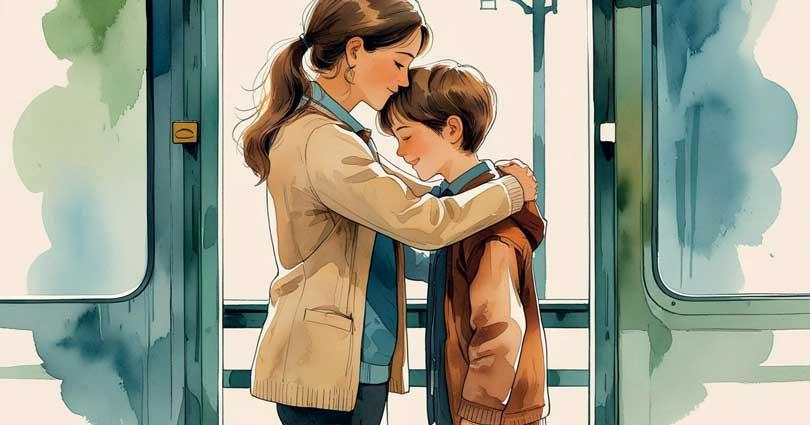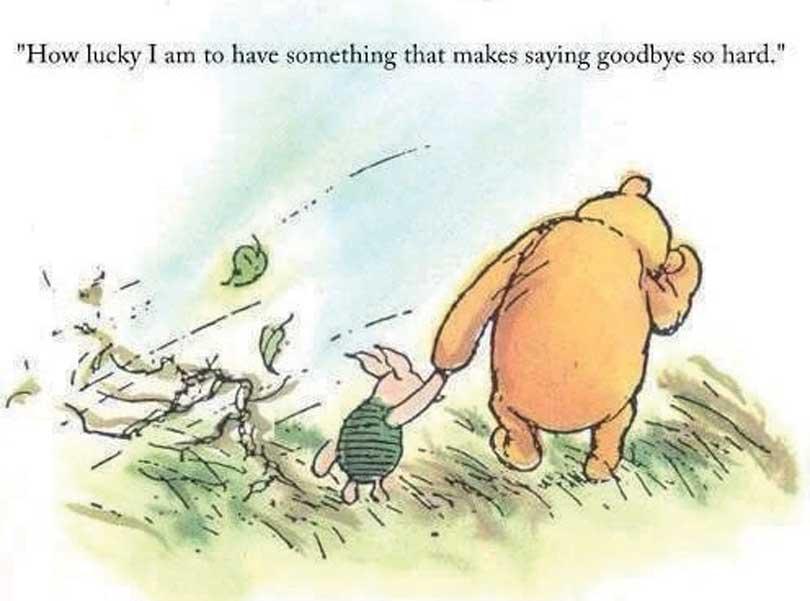



It is not just the person we are saying goodbye to; it is the routine, the shared jokes, the comfort of knowing they are there. Goodbyes destabilize the predictability we cling to
Goodbyes punctuate the story of human life. From leaving the comfort of a childhood home, parting from a dear friend after a visit, or saying farewell to a loved one who has passed away, goodbyes are moments that cut across all cultures, generations, and circumstances. No matter how young or old we are, no matter how expected or unexpected the situation, goodbyes always carry an ache. The difficulty doesn’t diminish with age or experience; it simply changes in form. But why is saying goodbye so universally painful, even when we know it is part of life?
The Weight of Attachment
At the heart of every difficult farewell lies the deep human instinct of attachment. From the moment we are born, we attach; to our parents, caregivers, places, and eventually to people and experiences that give our lives meaning. These attachments help us feel safe and connected, but they also mean that separation feels unnatural. Psychologists often describe goodbyes as a ‘mini grief,’ a small rehearsal of loss. When we part from someone or something, our brain registers it as a break in that sense of belonging. Even temporary goodbyes, such as the end of a holiday or a child going off to school, stir a sense of rupture. It is not just the person we are saying goodbye to; it is the routine, the shared jokes, the comfort of knowing they are there. Goodbyes destabilize the predictability we cling to.
Childhood Goodbyes: First Lessons in Loss
Children encounter their first goodbyes very early in life. A toddler waving to a parent at daycare may cry as if their world is collapsing, because in that moment it is. Young children live in the present; they don’t yet grasp the idea that the parent will return. As children grow, the goodbyes become more layered. Moving schools, saying goodbye to a best friend, or leaving a beloved home can feel monumental. While adults might brush these off as ‘small goodbyes,’ they lay the foundation for how a person learns to cope with separation later in life. For many, those early experiences never fully lose their sting. The child within us continues to feel the same pang of abandonment when parting ways with someone we love. The difficulty of goodbye, then, is not just about the present, it’s also a conversation with all the other goodbyes we’ve ever had.
Adolescence: The Goodbye to Childhood
Teenagers face a unique kind of farewell: the slow, sometimes painful goodbye to childhood itself. As they grow into adulthood, they say goodbye to innocence, dependence, and the familiar safety net of parents. Leaving home for university, stepping into a first job, or embarking on independent travels are milestones often accompanied by excitement, but also grief. This stage is often underestimated. Society frames it as growth and freedom, yet for many, the departure from childhood is a quiet heartbreak. Friend groups dissolve, childhood homes no longer feel the same, and the transition into adult responsibility demands a farewell to a past self.
Adulthood: Goodbyes That Define Us
Adulthood is littered with goodbyes that shape our identities. Some are expected: leaving a job, moving cities, ending a relationship. Others are devastatingly abrupt: breakups we didn’t want, sudden illnesses, or the death of a loved one. Goodbyes in adulthood often intersect with identity. A person who leaves a long-term career isn’t just saying goodbye to an office; they are saying goodbye to the version of themselves that found purpose in that role. When a marriage ends, it isn’t only the partner we lose, but also the shared dreams, routines, and identity of being part of a couple. And when you move countries, the goodbye is even more profound. You don’t just leave your friends and family behind, you leave your safety net, your safe place, your home, your life. You miss your best friend’s birthday, your goddaughter’s graduation; you’re not there to support your friend through a divorce or breakup. You miss being there. You leave your entire life as you know it at that moment behind. Starting fresh can be exciting, but the cost is the constant ache of knowing that pieces of your old world continue without you. Each farewell is layered: what we say goodbye to externally, and what we relinquish internally.
Ageing and the Long Goodbye
In later life, goodbyes become both more frequent and more profound. Retirements, children leaving home, friends passing away; ageing is marked by a series of inevitable partings. Older adults often describe this stage as a long series of goodbyes: to physical abilities, to independence, to peers, to the certainty of time ahead. The difficulty lies not only in the sheer number of goodbyes but also in their finality. When a friend dies, there is no “see you later.” When a house is sold after decades, it is a permanent farewell to a place filled with memories. And yet, many older people also speak of developing resilience. With each goodbye comes perspective: an appreciation for what was shared, and an acceptance that letting go is a part of the human condition. The pain never disappears, but it is carried differently, with wisdom, with gratitude, and with the awareness that all connections are temporary but deeply meaningful.
Why Goodbyes Hurt, Even When We Choose Them
Sometimes we choose the goodbye ourselves, yet it still hurts. Think of leaving a job you’ve outgrown, ending a toxic relationship, or moving abroad for a new opportunity. We know the decision is right, but the farewell still carries sadness. This is because saying goodbye doesn’t only involve loss; it also involves change. Humans are wired to seek stability. Even positive changes, such as a promotion or a dream move, come with the grief of leaving behind the familiar. The ache of goodbye is not a sign that the choice is wrong; it’s a sign that what we had mattered.
Cultural Rituals of Goodbye
Across cultures, rituals of goodbye exist precisely because the moment is so difficult. Funerals, wakes, graduation ceremonies, retirement parties; all of these are communal ways to soften the blow of parting. These rituals help us mark the transition, offering structure when emotions feel chaotic. They also remind us that goodbyes are not just private experiences but universal ones. Every culture finds ways to give weight and dignity to farewell, whether through words, ceremonies, or symbolic gestures.
The Lingering Power of Unsaid Goodbyes
Perhaps the most difficult goodbyes are the ones we never get to say. A sudden death, a relationship that ends without closure, a loved one who slips away in silence; all leave us haunted by words unsaid. Unfinished goodbyes can create lingering grief, because our minds replay what could have been. We imagine the conversation we didn’t have, the hug we didn’t give, the forgiveness we didn’t extend. These unfinished partings remind us that goodbye is not just about leaving; it is about being acknowledged in that moment of transition.
Technology and the Changing Nature of Goodbye
In today’s digital world, goodbyes have shifted in form but not in essence. Social media keeps us connected to people long after physical parting. We can still message an old friend on the other side of the globe or scroll through photos of someone who has passed away. In some ways, this softens the finality of goodbye, giving us the illusion of presence. And yet, technology also complicates goodbyes. Relationships can drag on in half-hearted texts, making closure harder. Digital footprints mean we are never fully gone from someone’s life. The permanence of online presence blurs the clean break that goodbyes once had. We may still need to say goodbye, but in an age of constant connectivity, it can feel messier, less conclusive.
A Universal Human Thread
Saying goodbye is one of the few experiences that truly unites all humans. Whether it is a child crying at the school gates, a young adult waving farewell at an airport, a middle-aged parent sending their child off to university, or an elder attending yet another funeral, the emotional thread is the same. Goodbyes are difficult because they are reminders of love, of attachment, of meaning. They show us how deeply we are connected to others, and how profoundly those connections shape our sense of self. If they didn’t matter, goodbye would be easy. But the very ache of farewell is proof that we lived fully, loved deeply, and belonged somewhere.
The Gift in Goodbye
While no one ever truly masters the art of goodbye, there is a strange gift hidden in it. Every painful parting is also a reminder to treasure what we have while we have it. The tears, the lump in the throat, the reluctance to let go; all point to the beauty of having experienced something worth missing. Goodbyes will never stop being hard, no matter our age or situation. But perhaps that is not a flaw of life; it is its essence. To say goodbye is to honour what has been, to hold it close even as we let it go. And in that paradox lies the story of being human: that the hardest part of life is also the truest sign of love.











